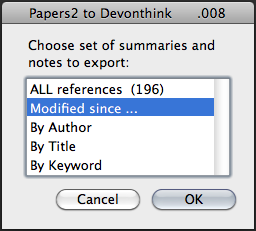I’m commenting here about whether the OP’s interpretation that Johnson would consider his ‘snippets’ approach to mean that Johnson himself would consider a database of pre-prepared abstracts of publications to be satisfactory for his own projects. I’m quite sure that Johnson would not be satisfied.
Steven Johnson is a prolific writer (a good one), and has often written about how important he finds DEVONthink databases for collecting and accessing information for his book projects. In a recent book, Where Good Ideas Come From: The Natural History of Innovation, Johnson describes his DEVONthink database (probably the one he used when writing that book). It consists of his own writings: chapters, essays, blog posts and notes. It also includes thousands of passages (quotes) transcribed from books or articles or clipped from Web pages.
Those quotes, sections of text in an article or book of up to a few hundred words, and that describe an idea, place, event or thing, are what Johnson means by his “snippets”. They are much richer than abstracts, and a single article or book might the the source of several snippets in his database.
Johnson uses DEVONthink’s See Also feature to explore the database for connections. For example: “Several years ago, I was working on a book about cholera in London and queried DEVONthink for information about Victorian sewage systems. Because the software had detected that the word ‘waste’ is often used alongside ‘sewage’, it directed me to a quote that explained the way bones evolved in vertebrate bodies: namely, by repurposing the calcium waste products created by the metabolism of cells. …it sent me off on a long and fruitful tangent into the way complex systems—whether cities or bodies—find productive use for the waste they create. That idea became a central organizing theme for one of the chapters in the cholera book.”
Conversely, while writing Johnson may drop a paragraph into DEVONthink and invoke See Also, to see whether there are interesting connections to other items in the database. (Had he been writing within the database, as I usually do, he could have selected that paragraph and invoked See Related Text, with the same result. I find it a wonderful way to explore ideas, or to break writer’s block.)
Note that Johnson’s database includes longer items, as well as those snippets of up to 500 words. In other writings, he has noted that he uses assistants to help scour the literature for excerpts that go into his database (I don’t have that luxury).
My reference databases differ from Johnson’s in that I prefer including complete articles, reports or even books. I do most of my reading and research within a database, as it provides a rich environment including powerful searching and, of course, See Also. If I wish to see what other documents contain a particular term, Option-click immediately lists them. or I can select a phrase and do a Lookup search for that phrase.
I don’t find most papers or articles too large to make See Also less functional for me. True, if See Also suggests a large report or a book, I may have to search within it for the relevant section. I mitigate that over time, for interesting topics, by adding a linked rich text note that may include an excerpt (like one of Johnson’s snippets), or summary with comments—and that note might expand to cite similar references in the database, perhaps with page links or Lookup phrases that make finding the important section easier.
Abstracts? I collect very few, usually from journals to which I don’t have full access, or for a topic that’s of only potential interest and thus as a ‘marker’ for a reference that I might want to explore more fully, later. Otherwise, I want the full article in my database, if the topic is one in which I’m interested.


 ).
).